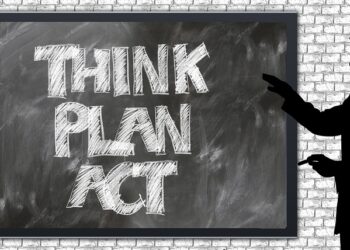Unlocking the Power of Critical Thinking: A Blueprint for Success
In today’s fast-paced and ever-changing world, the ability to think critically is more important than ever. Critical thinking is the process of analyzing, evaluating, and interpreting information in order to make informed decisions and solve complex problems. It is a skill that can be learned and developed over time, and when mastered, can lead to greater success in both personal and professional endeavors.
What is Critical Thinking?
Critical thinking is a cognitive process that involves analyzing and evaluating information in order to make reasoned judgments. It requires the ability to think logically, reason effectively, and consider multiple perspectives. Critical thinking is not about being critical or negative, but rather about being objective and open-minded. It involves asking questions, gathering information, and evaluating evidence in order to come to a well-reasoned conclusion.
The Importance of Critical Thinking
Critical thinking is an essential skill in today’s information-driven society. With the rise of fake news, misinformation, and biased sources, the ability to think critically is more important than ever. Critical thinking allows individuals to separate fact from fiction, make informed decisions, and solve complex problems. It is a skill that is highly valued by employers, as it is essential for success in the workplace.
How to Develop Critical Thinking Skills
Developing critical thinking skills takes time and practice, but it is a worthwhile investment in your future success. Here are some tips for unlocking the power of critical thinking:
1. Ask Questions: One of the key aspects of critical thinking is asking questions. By asking questions, you can gather information, clarify your understanding, and challenge assumptions. Be curious and open-minded, and don’t be afraid to question the status quo.
2. Gather Information: In order to think critically, you need to gather information from a variety of sources. Be sure to consider multiple perspectives, and seek out reliable and credible sources of information. Avoid relying solely on one source, and be wary of bias and misinformation.
3. Evaluate Evidence: Once you have gathered information, it is important to evaluate the evidence in order to make informed decisions. Consider the credibility of the source, the relevance of the information, and the accuracy of the data. Look for patterns and inconsistencies, and be willing to change your mind if new evidence emerges.
4. Consider Multiple Perspectives: Critical thinking involves considering multiple perspectives and viewpoints. Be open to new ideas and different ways of thinking, and be willing to listen to others who may have a different opinion. By considering multiple perspectives, you can gain a deeper understanding of the issue at hand.
5. Practice Problem-Solving: Critical thinking is not just about analyzing information, but also about solving problems. Practice problem-solving skills by tackling complex issues, breaking them down into smaller parts, and developing creative solutions. Be willing to take risks, think outside the box, and learn from your mistakes.
6. Reflect on Your Thinking: Finally, it is important to reflect on your thinking process and evaluate your decision-making. Consider what worked well, what could be improved, and how you can apply critical thinking skills in the future. By reflecting on your thinking, you can continue to develop and strengthen your critical thinking skills.
The Benefits of Critical Thinking
There are many benefits to developing critical thinking skills. In addition to making informed decisions and solving complex problems, critical thinking can lead to greater success in both personal and professional endeavors. Here are some of the key benefits of critical thinking:
1. Improved Decision-Making: Critical thinking allows individuals to make well-informed decisions based on evidence and reasoning. By considering multiple perspectives and evaluating evidence, individuals can make better choices and avoid common pitfalls.
2. Enhanced Problem-Solving: Critical thinking is essential for solving complex problems and identifying creative solutions. By breaking down problems into smaller parts, considering multiple perspectives, and evaluating evidence, individuals can develop effective strategies for solving even the most challenging issues.
3. Better Communication: Critical thinking involves clear and logical communication. By thinking critically, individuals can express their ideas clearly, listen to others with an open mind, and engage in meaningful dialogue. Effective communication is essential for success in both personal and professional relationships.
4. Increased Creativity: Critical thinking involves thinking outside the box and considering new ideas and perspectives. By practicing critical thinking skills, individuals can tap into their creativity and develop innovative solutions to problems. Creativity is highly valued in today’s fast-paced and competitive world.
5. Greater Self-Awareness: Critical thinking involves self-reflection and evaluation. By reflecting on your thinking process, evaluating your decision-making, and considering alternative perspectives, individuals can develop greater self-awareness and emotional intelligence. Self-awareness is key to personal growth and success.
In conclusion, critical thinking is a valuable skill that can lead to greater success in both personal and professional endeavors. By asking questions, gathering information, evaluating evidence, considering multiple perspectives, practicing problem-solving, and reflecting on your thinking, you can unlock the power of critical thinking and achieve your goals. Developing critical thinking skills takes time and practice, but the benefits are well worth the effort. So take the time to invest in your critical thinking skills and unlock your full potential for success.
















